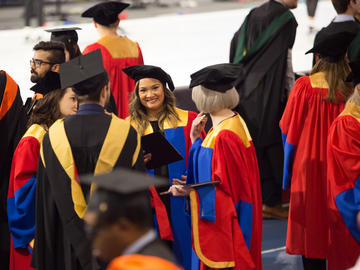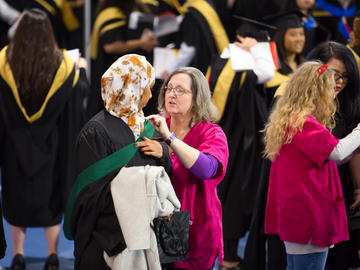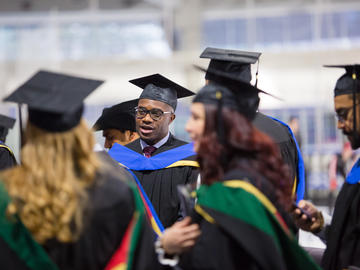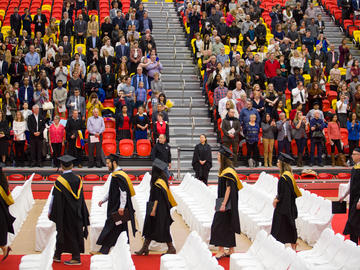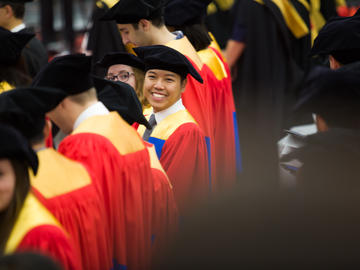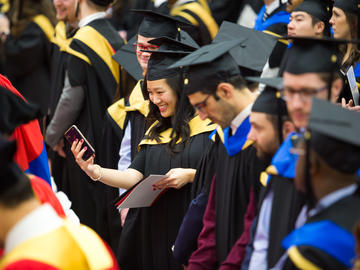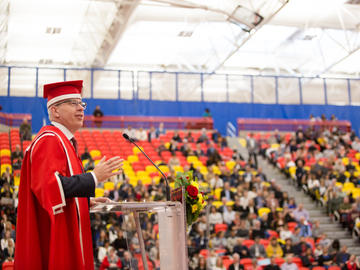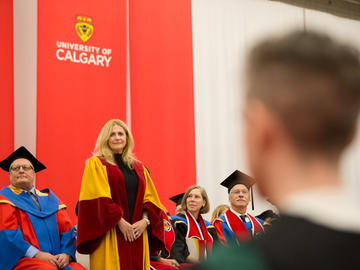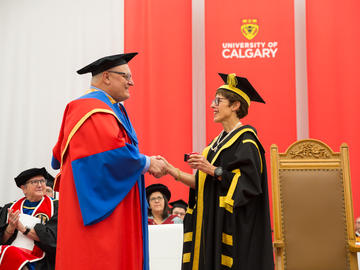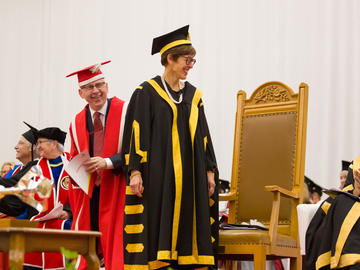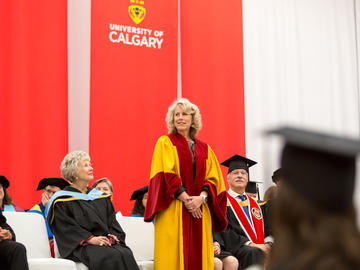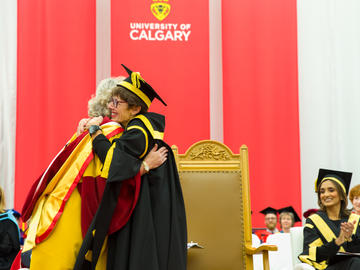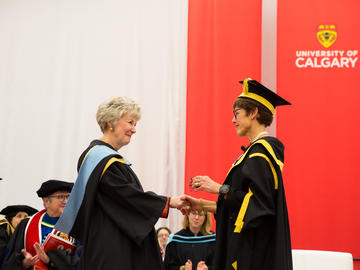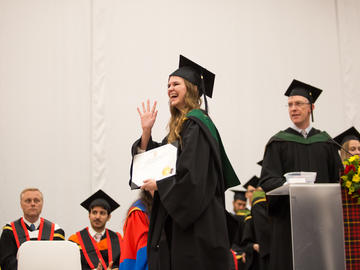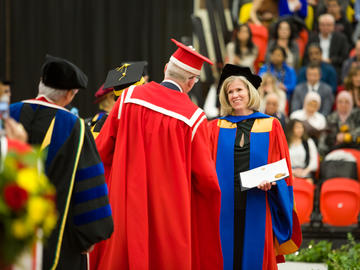Nov. 15, 2019
Class of 2019: MA grad’s hard path from Ghana and polio to UCalgary convocation stage

When David Achuroa’s name is called on Friday afternoon at the University of Calgary’s fall convocation ceremony he’ll rise up, steady himself on his leg braces and cross the Olympic Oval stage on crutches to formally accept his MA in social cultural anthropology. It might be the easiest and most satisfying journey he’s ever known because the 33-year-old graduate’s path to that stage has been unimaginably hard-won.
Born in the Builsa North district of Ghana, in a farming village called Balansa, with no electricity, amenities or health-care facilities, Achuroa was afflicted by polio at the age of two, a disease which left him crippled.
The nearest town for support, Bolgatanga, was 30 kilometres away and Achuroa’s family, who lived on less than a dollar a day, had no means of getting him there. Nor could they get him to the nearest school when he came of age. Achuroa was loved by his family and treated kindly within his community. He helped on the farm in the limited ways that he could. But he always felt like a burden.
David Achuroa returns to his village of Balansa, in the Builsa North District of Ghana.
Courtesy David Achuroa
His life changed at the age of 11 when a Presbyterian rehabilitation program in Builsa North District’s capital, Sandema, learned of his condition and sent a support worker to the family home. Finally, Achuroa had some semblance of independent mobility thanks to the crutches and leg braces provided to him. He was able to attend kindergarten for the first time at the age of 12.
“Getting to school was a challenge,” he recalls. “It was about a 45-minute walk each way and the path was rough, very narrow and rocky. I was learning to walk on my crutches and there were many falls along the way.”
In school Achuroa made up for lost time. “I told my father I wanted to become somebody,” he says. “I knew if I didn’t study I would become a liability to my community, and so I studied hard. This was my passion. I wanted to catch up to the other students. I was very driven.”
He remembers studying by lantern light every evening for up to five hours after his family went to sleep. On rainy evenings he would sleep with one ear always on the alert listening for leaks in the roof of the family’s mud hut. “If I heard even a drop I would get up and get a bowl to collect the water,” he says. “Otherwise, my room would flood and destroy my books."
And my books were everything to me.
Before long, Achuroa caught up to his age group academically. Then he began to greatly exceed expectations. When he graduated from high school, he was offered four scholarships which allowed him to attend the University for Development Studies in Tamale. There, he completed his undergraduate degree in community nutrition and for a time returned to Balansa where he provided much-needed support to people with disabilities, and deprived children.
Along the way Achuroa crossed paths with educators and aid workers from Calgary, one of them being Dr. Caesar Apentiik, PhD, a senior instructor of African Studies and Development Studies at the University of Calgary. Apentiik encouraged Achuroa to apply for the Queen Elizabeth II Diamond Jubilee Scholarship, dedicated to mobilizing a community of global leaders through international student exchanges.
When Achuroa arrived in Calgary in January 2017, bound for the university, he admits to feeling frightened. He had never been outside of Ghana. He had never flown on a plane. Ice and snow were things he had only read about and, frankly, they terrified him.
“What have I gotten myself into?” he thought. “I had no idea how cold it could be. How was I going to get around on this ice and snow with crutches and braces? How would I balance myself?”
In a way, it brought him back to the 12-year-old boy he had been, struggling along the rocky path that led him to the classrooms that had so long been denied him. Achuroa was scared, but he knew, given his past, that he had the strength to survive in Calgary.
He didn’t just survive. He thrived.

Mud huts in the farming village of Balansa, in Ghana, like the ones David Achuroa grew up in.
Courtesy David Achuroa
Working with his supervisor, Dr. Charles Mather, PhD, and his mentor, Apentiik, in the Department of Anthropology and Archaeology, Achuroa was encouraged to use his personal history as a grounding point for his research. Drawing from the fields of medical anthropology, development studies and cultural anthropology, he researches the religious and ethnomedical conceptualizations of disabled children in his native Ghana.
This work brought Achuroa back to his village on two separate occasions where he interviewed other families with disabled children. “It was very emotional for me to interview these parents, because they experienced what my parents experienced, and it was very hard on them,” he says. “It’s like drowning in a river. What do you hold on to, to survive? They struggled to find the best supports available.”
Achuroa plans on pursuing his PhD, with his goals set on contributing to the development of his village. “I need to build myself up in a way that, one day, when I return home, I can do more to support those families and their children with disabilities,” he says. “This is what I want to accomplish in life. It means everything to me.”



